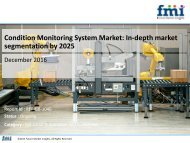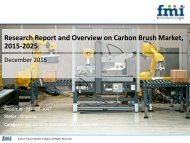E-Waste Management Market
Create successful ePaper yourself
Turn your PDF publications into a flip-book with our unique Google optimized e-Paper software.
Global E-<strong>Waste</strong><br />
<strong>Management</strong> <strong>Market</strong><br />
Share, Global Trends,<br />
Analysis, Research, Report,<br />
Opportunities,<br />
Segmentation and Forecast,<br />
2014-2020<br />
Future <strong>Market</strong> Insights<br />
www.futuremarketinsights.com<br />
sales@futuremarketinsights.com
Future <strong>Market</strong> Insights (FMI) is a premier provider of syndicated research reports, custom research reports, and consulting<br />
services. We deliver a complete packaged solution, which combines current market intelligence, statistical anecdotes,<br />
technology inputs, valuable growth insights, aerial view of the competitive framework, and future market trends.<br />
We provide research services at a global as well as regional level; key regions include GCC, ASEAN, and BRIC.<br />
Our offerings cover a broad spectrum of industries including Chemicals, Materials, Energy, Technology, Healthcare, and<br />
Retail.<br />
We have a global presence with delivery centers across India specializing in providing global research reports and country<br />
research reports. FMI is headquartered out of London, U.K., with a state-of-the-art delivery center located in Pune, India.<br />
We combine our knowledge and learning from every corner of the world to distill it to one thing – the perfect solution for<br />
our client.<br />
Research Capabilities<br />
• Customized Research<br />
• Syndicated Research<br />
• Investment Research<br />
• Social Media Research<br />
Sector Coverage<br />
• Automotive and Transportation<br />
• Electronics, Semiconductor, and ICT<br />
• Retail and Consumer Products<br />
• Industrial Automation and Equipment<br />
• Chemicals & Materials<br />
• Food and Beverages<br />
• Services and Utilities<br />
• Energy, Mining, Oil, and Gas<br />
Customized<br />
Research<br />
Syndicated<br />
Research<br />
Investment<br />
Research<br />
Social Media<br />
Research<br />
Subscription Information<br />
For detailed subscription information please contact<br />
Hari. T (Sr. Manager - Global Business Development)<br />
T: +44 (0) 20 7692 8790 | D: +44 20 3287 4268<br />
Email: hari.t@futuremarketinsights.com
Report Description<br />
E-waste or electronic waste is waste material created by rejected electronic devices and<br />
components as well as materials involved in their manufacture or use. Although e-waste<br />
is a generic term, it cover televisions, computers, mobile phones, white goods such as<br />
fridges, washing machines, toys, tablets, digital cameras, dryers, home entertainment<br />
systems, stereo systems, toasters, kettles – almost any household or business item with<br />
circuitry or electrical components with power or battery supply. E-waste is mounting<br />
exponentially since manufacture of electronic products are growing rapidly in many parts<br />
of the world due to inclination of people towards technology and electronic gadgets.<br />
The growing market penetration in developing countries, replacement market in<br />
developed countries and a high undesirability rate make e-waste one of the fastest waste<br />
streams. This form of waste is posing a serious concern in disposal and recycling to both<br />
developing and developed countries. E-waste can be used as a resource that contains<br />
useful material for economic benefit in recovery of plastic, iron, glass, aluminium, copper<br />
and other precious metals such as silver, gold, platinum and palladium, and lead,<br />
cadmium, mercury etc. However, some components contain toxic substances which<br />
adversely affect human health and environment, increasing land, air and water pollution.<br />
Few toxic chemicals widely used are lead, cadmium, mercury, beryllium, BFR, polyvinyl<br />
chloride and phosphor compounds, polychlorinated bi-phenyls (PCBs), etched chemicals,<br />
and arsenic and flame retardants. Vain and incompetent waste management results in<br />
greenhouse gas and toxic emissions, and the loss of precious materials and resources.
Report Description<br />
Request Free Report Sample@<br />
http://www.futuremarketinsights.com/reports/sample/rep-gb-117<br />
One of the main reasons for growth of e-waste is rapid product innovation, especially in<br />
electronics and home appliances like migration from analogue to digital technologies and<br />
to flat-screen televisions and monitors. Additionally, economic growth coupled with<br />
urbanization and industrialization, and mass production of electronic goods have led to<br />
price reduction of these goods, almost doubling the universal demand for such products<br />
which eventually turn into e-waste. According to the UN, more than 33% increase in<br />
electronic waste is expected in the coming four years.<br />
Major regions across the globe generating e-waste is the United States, followed by<br />
Europe and Asia-Pacific. The average e-waste produced by the U.S. in 2012 was estimated<br />
to be about 29 kg per person. The lowest e-waste producing countries were Haiti, which<br />
generated less than 8,000 tonnes of waste in 2012, followed by Afghanistan.<br />
Request For TOC@ http://www.futuremarketinsights.com/toc/rep-gb-117<br />
Many IT and electronic goods manufacturing companies like Dell, Cisco, HP as well as<br />
multiple agencies from Switzerland, Egypt, England, China, Japan and others have joined<br />
hands with StEP (Solving the E-waste Problem), a global organization for improving e-<br />
waste disposal methods. Various other measures are being adopted to minimize e-waste,<br />
including technical intervention like product design, production process modification, use<br />
of renewable material and energy, and green packaging option. Then there is the
Report Description<br />
policy-level intervention which clearly defines e-waste for regulation. It includes a take<br />
back policy wherein producers are responsible for the complete lifecycle of their<br />
products. Lastly, awareness building measures are taken where citizens can get to know<br />
what necessary steps they need to follow in order to avoid e-waste, like donating<br />
electronics for reuse which could extend the lives of the electronic products, opting for<br />
products which are made of less toxic material and use minimal packaging, and offer<br />
leasing or take back options.<br />
Browse Full Report@<br />
http://www.futuremarketinsights.com/reports/global-e-waste-management-market
Thank You!<br />
To know more about us, please visit our website:<br />
www.futuremarketinsights.com<br />
For sales queries or new topics email us on:<br />
sales@futuremarketinsights.com<br />
Future <strong>Market</strong> Insights: 616 Corporate Way, Suite 2-9018,<br />
Valley Cottage, NY 10989, United States<br />
T: +1-347-918-3531 | D: +1-845-579-5705


















